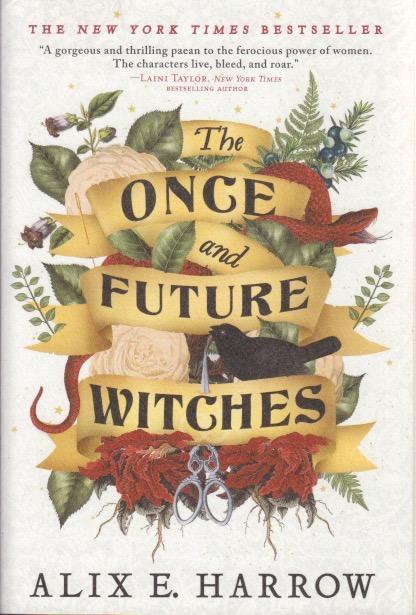
Recommended as a worthwhile contemporary gothic novel, Alix E. Harrow’s The Once and Future Witches is a feminist tour de force. Set in a world similar, or perhaps parallel, to ours, it follows three witch sisters in 1893. The sisters are estranged, having been raised by an abusive father, and each has found her own way to New Salem. The old Salem had been destroyed after the witch trials. The three find their lives drawn together, not even knowing the others are there. But there are also still witch hunters. None worse than Gideon Hill, the leading candidate for mayor. I’ve long known that books written after Trump are often fairly obvious for the hatred that oozes from political leaders. This is one such case. The story is one of female empowerment in the face of constant male opposition. It goes fairly quickly for a book its size.
It’s an enjoyable read but it grows, well, harrowing towards the end. You come to like these three very different sisters and appreciate the gifts they offer to their world. Men, however, make the rules and often they feel that women have no place in making decisions for the public good. I’m amazed at the number of people who still believe this. It makes novels such as this so important. Women with power are crucial examples to present. The three sisters may cause mayhem, but it is generally good for the city. When men are in charge, things tend to get repressive. Sound familiar?
Conveying the gist of a 500-page novel isn’t a simple task so I’ll simply say that this isn’t a conventional witch story. There’s never a question that witches are good, but capable of doing bad things. In other words, they are pretty much like all of us. That’s not to deny that some people become evil and that such people will gain ardent, blind followers. The characters are memorable and likable in their very humanness. As far as genre goes, this is a magical realism novel. As you get drawn into Harrow’s world it becomes believable. It’s a book that should be widely read and its plea for tolerance must be heard. I can think of other comparisons—others have also conveyed that an unquestioning religion may become evil unintentionally. Such conversions aren’t the kind publicly discussed, but they do fit with human experience. I’ve intentionally left out spoilers since I want to encourage readers. It certainly has left me thoughtful.
